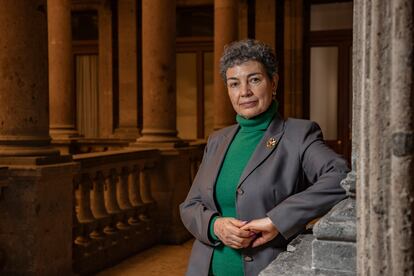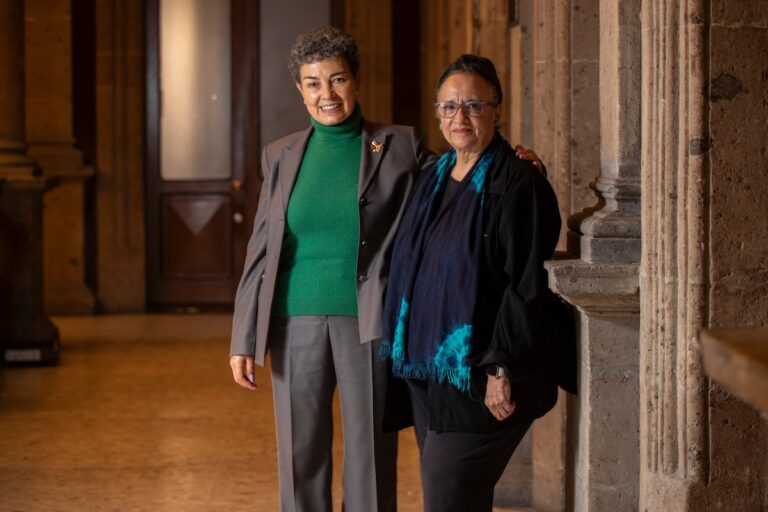Mexican immigrants in the United States are aging, and many do not have sufficient pensions or savings to support themselves. After decades of hard work, many people over 65 reach retirement without being able to stop working. While some receive pensions, the majority do not. Others receive amounts that are too small to cover basic expenses, such as rent or health insurance. It is estimated that about two million elderly Mexican immigrants live in the United States. Of these, about 500,000 are undocumented.
This week, a group representing about 70 civic organizations visited Mexico's National Palace with a specific request to Claudia Sheinbaum's government: allowing Mexican immigrants to access PenEstar — the country's retirement program — even if they do not live in Mexico.
The group is part of the National Day Labor Organizing Network (NDLON). Two prominent members, Maria Marroquín and Angela Sanbrano, spoke at the morning press conference. Both women have spent most of their lives working in the United States and know firsthand what it's like to work in precarious hourly jobs. For many years, they sent remittances home, supporting the U.S. and Mexican economies with their labor.
“These people spend decades working in the fields, gardening and building, and when they grow up there is no work because they no longer have the strength,” explains Marroquín, 66, who is originally from Puebla and now lives in California. “They are tired of working all the time.” Their lives.” She coordinates the Day Workers Center, a nonprofit organization in Mountain View.
The group is calling on Mexican immigrants over the age of 65 to receive $300 every two months (about 6,000 pesos) from the Mexican government. Without the ability to work or receive a pension, these elderly people often find themselves marginalized by a system that has abandoned them to their fate. “When we get older, neither Mexico nor the United States wants us,” says Marroquín, who points out that many of the diseases these populations face stem from the hard work they have done for decades. “Both countries are failing these populations who are caught in the middle,” she added.
Despite their years of contribution, these individuals are left without support. Employers will not hire them, and neither government provides a path to retirement or pensions. “The U.S. government doesn't give pensions to these people because they didn't pay into the system, but they contributed by paying taxes,” Marroquin says. “They have ID numbers linked to the payments they've made throughout their lives.”
“It's unfair because the United States would not be the country it is today if it weren't for Latinos. “We are a very important part of the country’s economy,” Angela Sanbrano adds.
The network of migrant organizations was optimistic about the creation of Pensión Bienestar during the administration of former Mexican President Andrés Manuel López Obrador. This program allows all adults over 65, regardless of whether they have paid contributions, to receive a payment of 6,000 pesos (about $300) every two months. However, current requirements mandate residency in Mexico, effectively excluding immigrants living abroad from receiving this benefit.
But recent constitutional reform enshrined social programs, including pensions for the elderly, as inalienable rights in the Magna Carta. “I did not cross the border; “It crossed the line for me,” says Angela Sanbrano, 79, originally from Ciudad Juarez and a Los Angeles resident for more than 60 years. “A Mexican takes his rights wherever he goes, right? The pension is our right as Mexicans, so we ask our government not to forget us.”
Before leaving office, former Lopez Obrador announced that Mexican workers in the United States would qualify for the national Social Security program. However, this procedure has not yet been implemented. Three months after the new administration took power, the government of President Claudia Sheinbaum inherited this mandate. Sheinbaum said Mexican workers abroad are “heroes and heroines” and she appreciates the hard work they do. However, she explained that her government must evaluate the national budget before providing a final response to the request.
Implementing pensions for Mexicans abroad would require at least 21 billion pesos (about $1 billion). “We believe our issue has gained significant attention following the President's response,” the National Day Workers Organizing Network stated. They noted that Sheinbaum “understood the humanitarian significance” of their appeal and appreciated its sincerity. “We are confident that the authorities’ budget analysis will take into account the urgent needs of Mexicans in the United States,” they added in a statement.

Ninety-six percent of remittances sent to Mexico come from the United States. Mexican migrants send money back to their families, and these remittances have become one of the most important sources of income, especially for the most vulnerable families. Since records began, remittances have been steadily growing year after year, and have emerged as a vital source of financing for the Mexican economy. Last year, it exceeded 63 billion pesos (about $3 billion), and that number is expected to be surpassed again this year.
Donald Trump's imminent arrival at the White House has intensified concerns about the immigration status of thousands of people, including those over 65 who could face deportation. The incoming administration threatened to carry out mass deportations of approximately 11 million people. He added: “Difficult times await migrants with Donald Trump, but we are ready to fight.” Sanbrano says optimistically: “We are Mexicans, we have overcome many crises, and we are still here.”
Many years later, the two women now hold dual citizenship, although they maintain that Mexico will always be their home. “Let's say my roots are Mexican, and in the United States, I grew branches and some very beautiful fruits,” Marroquín says, referring to her son and grandchildren. “Mexicans are a nation that has one foot in every country, and that is what makes us who we are, whether we like it or not,” Sanbrano adds.
Subscribe to our weekly newsletter to get more English-language news coverage from EL PAÍS USA Edition
